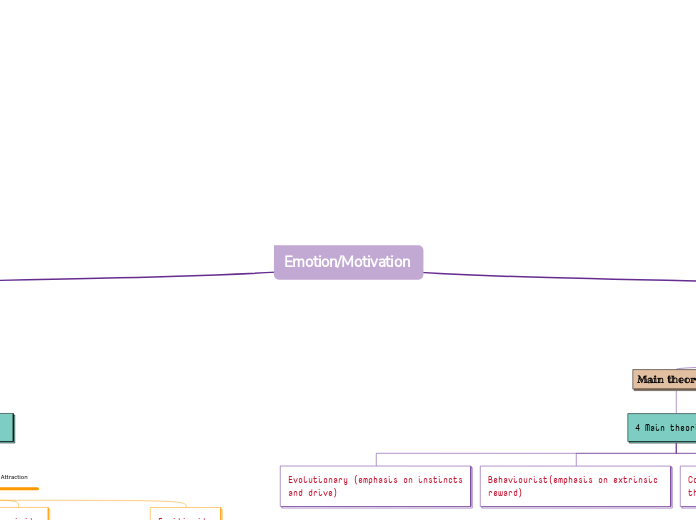Emotion/Motivation
Emotion
Robert PlutChik's 8 Basic Emotions
Sadness, anger, anticipation, joy, fear, trust, surprise, and disgust
One theory is that these basic emotions are innate and set the stage for the development of related emotions. Another suggests that more complex emotions results from combinations.
Emotional Intelligence (EQ)
The ability to understand our own emotions and those of others, and applying this information to our daily lives.
4 Factors of EQ
1) Self awareness
2) Self Regulation
3)Empathy
4) Skilled relationship
James/Lange
Arousal - Heart pounding/sweating - Fear (emotion)
Cannon/Bard
Arousal - Heart Pounding + Fear (emotion)
Schachter/Singer
2 Factor, requires cognitive label
Lazarus
Cognitive meditational, requires appraisal.
Love
Attraction
3 Major things that Cause Attraction
Similarty
being similar and having things in common
Proximity
Living near each other and seeing each other often
Familiarity
Knowing each other
Motivation
Main theories
4 Main theories
Evolutionary (emphasis on instincts and drive)
Behaviourist(emphasis on extrinsic reward)
Cognitive (emphasis on intrinsic thoughts)
Humanistic (depends on where you are on Maslow’s hierarchy of needs).
Drive - Need
Drive
an internal arousal condition that directs an organism to satisfy physiological needs.
Need
a state of physiological imbalance usually accompanied by arousal.
Drive Theory
an explanation of behaviour that assumes that an organism is motivated to act because of a need to attain, re-establish balance, or maintain some goal that aids survival.
Conflict
the emotional state or condition that arises when a person must choose between two or more competing motives, behaviours, or impulses.
3 Types
Aproach -approach conflict - 2 good choices
Avoidance-Avoidance conflict - 2 bad choices
Approach-avoidance conflict
Flow
The ultimate goal with schooling is to experience flow.
the experience of becoming completely and pleasurably absorbed in an intrinsically motivated behaviour.
